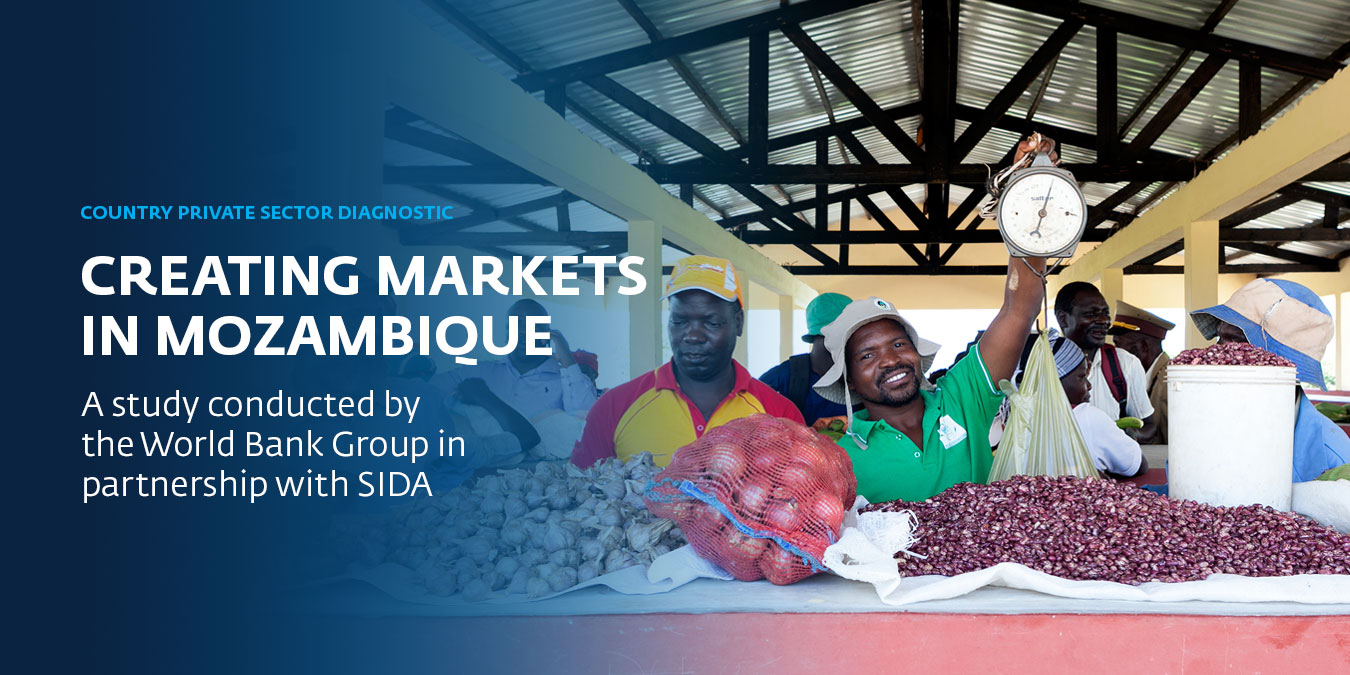
Maputo, Mozambique, June 30, 2021—Mozambique could diversify its economy, build a broader base for growth, and create more jobs by promoting stronger private sector investment and development, especially in growing markets such as agribusiness and housing construction, according to a new World Bank Group report.
The Mozambique Country Private Sector Diagnostic (CPSD) report, prepared by IFC and the World Bank, found Mozambique has an opportunity to spur more inclusive and sustainable growth by increasing productivity in key sectors, strengthening investment policy and promotion, and better integrating smaller businesses into the supply chains of big energy and infrastructure projects.
The report also explores the opportunity for Mozambique to leverage its rich natural resources such as fisheries and nature-based tourism, while further developing the transport, energy, and financial services sectors.

"Mozambique has immense potential to grow its economy, reduce poverty, and create jobs, but only if it puts in place measures that will attract and encourage investment and expertise in key sectors," said Hector Gomez Ang, IFC's Country Manager for Mozambique. "The country's private sector can be a driver of opportunity and recovery from COVID-19, and IFC and the World Bank look forward to deepening our partnership with Mozambique and supporting the creation of more opportunities for its people."
The report, which analyzed key sectors of Mozambique's economy and provides a road map for growth, highlights the urgent need to bolster the country's private sector, which is dominated by informal, small-scale enterprises, especially in the wake of COVID-19. The pandemic has been particularly hard on Mozambique's small businesses, especially those in the tourism, hospitality, and export sectors. Natural disasters have also compounded these challenges.
"To reduce poverty and strengthen the private sector's role in the economy, given the context of fragility, compounding with other vulnerabilities, it will be key that Mozambique adjust its growth model," said Idah Z. Pswarayi-Riddihough, the World Bank Country Director for Mozambique, Madagascar, Mauritius, Comoros and Seychelles, Eastern and Southern Africa.
Historically, Mozambique's economic growth has been underpinned by the extractive sector and large-scale infrastructure projects. However, this growth model has not provided sufficient job opportunities for the country's rapidly growing population. An estimated 500,000 young people are expected to enter Mozambique's labor market every year between now and 2050.
Mozambique's government has a five-year plan (2020-2024) to create more jobs, support economic growth, and increase productivity by promoting a more diversified and competitive economy with a focus on agribusiness, fisheries, tourism, infrastructure-related sectors, and extractives
To help achieve the plan's goals, the report recommends Mozambique's public and private sector to work together to promote skills training and capacity-building programs to help more small businesses to capture opportunities linked to large infrastructure projects, develop local sourcing policies to enable smaller businesses to access markets and finance, and consider reforms that promote competition.
The Mozambique CPSD can be downloaded here.
About the Country Private Sector Diagnostic (CPSD)
The World Bank Group's new Country Private Sector Diagnostics aim to identify sectors where private sector solutions can create or expand markets and make substantial contributions to development impact. The diagnostics uses a structured approach to analyze key sectors with unrealized private sector potential in each country, select several sectors for deeper analysis, and make recommendations for action. The sector analyses, conducted with significant input from teams across the World Bank Group and from external partners, provide valuable information on the challenges and opportunities to better leverage the private sector to achieve developmental objectives. The CPSD aligns with the World Bank Group's Maximizing Finance for Development (MFD) approach, which looks to private sector solutions to reach the 2030 Sustainable Development Goals.
About IFC
IFC—a member of the World Bank Group—is the largest global development institution focused on the private sector in emerging markets. We work in more than 100 countries, using our capital, expertise, and influence to create markets and opportunities in developing countries. In fiscal year 2020, we invested $22 billion in private companies and financial institutions in developing countries, leveraging the power of the private sector to end extreme poverty and boost shared prosperity. For more information, visit www.ifc.org.
About the World Bank Group
The World Bank Group plays a key role in the global effort to end extreme poverty and boost shared prosperity. It consists of five institutions: the World Bank, including the International Bank for Reconstruction and Development (IBRD) and the International Development Association (IDA); the International Finance Corporation (IFC); the Multilateral Investment Guarantee Agency (MIGA); and the International Centre for Settlement of Investment Disputes (ICSID). Working together in more than 100 countries, these institutions provide financing, advice, and other solutions that enable countries to address the most urgent challenges of development. For more information, please visit www.worldbank.org, www.miga.org, and www.ifc.org
Stay Connected
www.facebook.com/IFCwbg
www.twitter.com/IFC_org
www.youtube.com/IFCvideocasts
www.ifc.org/SocialMediaIndex
www.instagram.com\ifc_org
Contacts
Stay Informed
Sign up to have customizable news & updates sent to you.